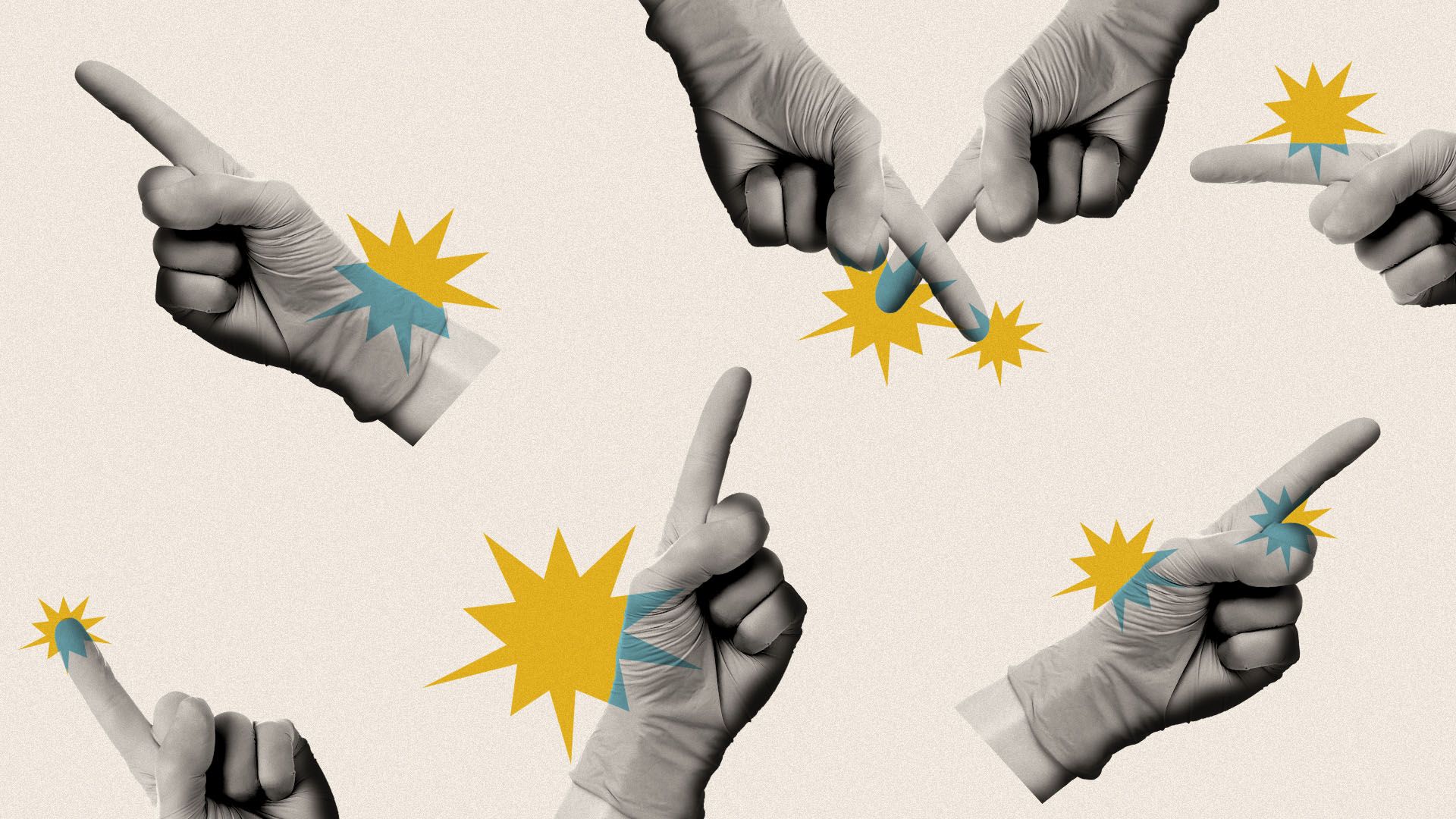Pandemic misinformation throughout the ages (it's not a new thing)
Add Axios as your preferred source to
see more of our stories on Google.

Illustration: Sarah Grillo/Axios
The infodemic of misinformation and disinformation around the coronavirus is a serious threat to understanding how to deal with the pandemic — but this is nothing new.
The big picture: Whether the Black Death, smallpox or COVID-19, deadly diseases strike fear into people and, as scientific understanding is still gathered, stories and theories can start percolating into more serious finger-pointing, xenophobia or even violence.
The latest: Conspiracy theories, alarmist information, fake "cures" and scams are flooding people's news feeds and social media about COVID-19. This is happening partly due to divergent messaging leading to confusion and mistrust in the government.
- Multiple entities are trying to counteract this, such as the World Health Organization constantly updating its myth-busting page and discussing erroneous information in press conferences.
- But the constant barrage has led to roughly a quarter of Americans feeling the news media is providing largely inaccurate information, per a recent Pew Research Center report.
- And, overall, this has led to growing racism and xenophobia worldwide and rising levels of hate and online toxicity.
This is not the first time false stories or misinformation spread as fast as the pathogen.
Flashback: The "parrot panic of 1930" is an interesting case of "an outbreak of hysteria" when somebody had a pet parrot that died and shortly after a few members of that family fell dangerously ill, says Lawrence Poos, a professor of history at the Catholic University of America.
- A Washington Post headline, "'Parrot Disease' Baffles Experts," captured the attention of Americans and helped foment a mass culling of parrots everywhere, per the New Yorker.
- Parrot fever is a rare infection caused by the bacteria Chlamydia psittaci that can now be treated with antibiotics.
More serious consequences were seen in the Black Death in the 14th century, which was caused by the bacteria Yersinia pestis transmitted from rodents to humans via fleas.
- But because no one in Europe knew the cause and some thought Jewish communities didn't seem to be dying as fast as others, there was a belief "it was all a Jewish plot," leading to a massacre of Jews, Poos says.
- "The Black Death wasn't just a European thing, it was a North African and Middle Eastern pandemic as well," Poos tells Axios. "There were other kinds of ethnic blaming, like the Turks and the Greeks, or the Turks and the Arabs."
Immigrants in general have often been targets of finger-pointing while also facing disparities in health care systems, says Judith Leavitt, professor emerita in the department of medical history and bioethics at UW Madison.
Smallpox outbreaks in 1894 in Milwaukee and New York City demonstrate this issue, Leavitt points out. Smallpox, caused by the variola virus, is contained via isolation and vaccination.
- "One of the reasons the outbreak was so bad [in Milwaukee] is because the health department was really viewed by the immigrant populations as being unfair and unequal in its application" of isolation and vaccination, she says.
- While wealthier middle-class families could isolate at home, crowding in immigrants' sections meant children were taken to the isolation hospital where their parents were afraid they would die, Leavitt tells Axios.
- This disparity combined with a general distrust in vaccinations in the German and Polish immigrant communities in Milwaukee, and an alderman who denounced health department efforts, led to rioting in the streets for a month.
New York City faced legal questions for its "shock and awe" military style of quarantining and vaccinating for smallpox in 1894.
- But this compares to the city's efforts 50 years later, Leavitt notes, where they vaccinated millions in four weeks.
- "The health department acted so completely different in every possible way," she says. "The same techniques of isolation and vaccinations were applied, but they were so even-handed ... and oriented toward public education and information" they had the cooperation of all of New York City.
The bottom line: The ability for storytelling and rumormongering to stymie efforts to stem outbreaks is not new, but with social media boosting their power, governments should make explicit efforts to address the issue via transparency on evidence-based scientific findings.
Go deeper: Coronavirus "infodemic" threatens world's health institutions
